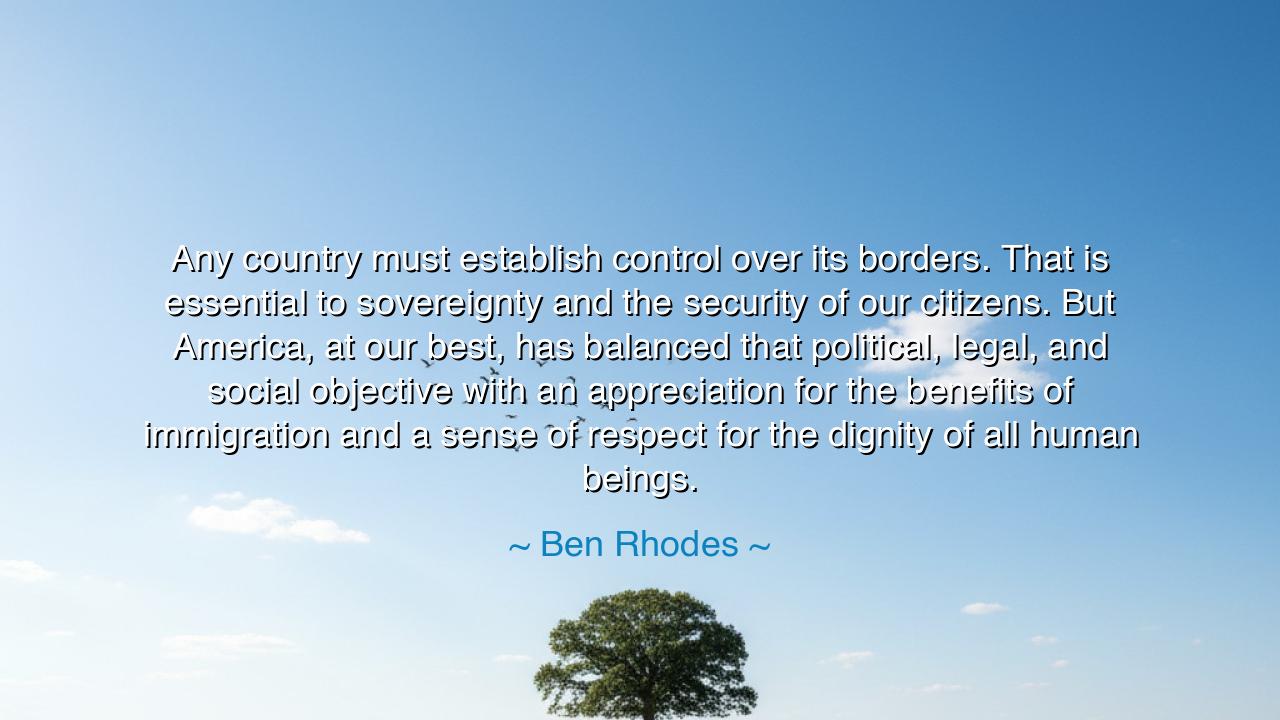
Any country must establish control over its borders. That is
Any country must establish control over its borders. That is essential to sovereignty and the security of our citizens. But America, at our best, has balanced that political, legal, and social objective with an appreciation for the benefits of immigration and a sense of respect for the dignity of all human beings.






When Ben Rhodes declared, “Any country must establish control over its borders. That is essential to sovereignty and the security of our citizens. But America, at our best, has balanced that political, legal, and social objective with an appreciation for the benefits of immigration and a sense of respect for the dignity of all human beings,” he spoke not as a mere policymaker, but as a student of history and humanity. His words reflect an ancient and eternal truth — that the strength of a nation is found not only in its walls of protection, but in its doors of compassion. He calls for the balance between firmness and mercy, between order and openness, between the duty to protect and the call to welcome. For sovereignty without compassion breeds tyranny, and compassion without structure leads to chaos.
In the style of the ancients, one might say Rhodes spoke as a wise steward of the republic, urging his people to remember that power must be tempered by virtue. His teaching carries the same spirit as the philosopher-kings of old, who warned that every nation stands upon two pillars — security and justice. Without the first, a people are conquered; without the second, they lose their soul. Thus, when Rhodes speaks of “control over borders,” he speaks not only of geography, but of discipline, the strength that guards against disorder. Yet when he speaks of “respect for the dignity of all human beings,” he evokes the sacred law written not by governments but by conscience — that every person, stranger or citizen, bears within them the same divine spark.
The origin of this quote lies in the deep and often divided conversation about immigration and national identity in the United States. Ben Rhodes, a foreign policy advisor and speechwriter for President Barack Obama, shaped his words from years of observing the delicate interplay between sovereignty and humanity. His insight emerged at a time when nations around the world were wrestling with the forces of migration, fear, and division — when the call to protect one’s homeland sometimes clashed with the call to uphold human dignity. In this tension, Rhodes reminds us that greatness lies not in exclusion nor in blind acceptance, but in balance, in the wisdom to hold both justice and mercy in one steady hand.
History offers powerful reflections of this principle. Consider the example of Ellis Island, that threshold of hope through which millions of immigrants passed at the dawn of the American century. The officers who stood at its gates carried both sword and torch — sword, to protect the nation from those who might harm it; torch, to guide the weary, the exiled, the dreamers who came seeking freedom. The process was not perfect, but it embodied the ideal Rhodes speaks of: security joined with compassion, law guided by empathy. It was through this balance that America grew mighty, forged not only by the native-born but by the courage of those who came from every corner of the earth to build a new life upon the same soil.
Yet the warning in Rhodes’s words is also clear. When a nation forgets this balance — when fear overtakes dignity or when sentiment weakens discipline — the harmony of society begins to unravel. The ancients knew this as the law of balance, the eternal rhythm of order and mercy. Sparta, which prized security without mercy, became strong but soulless. Babylon, which welcomed all without restraint, grew decadent and fell. The lesson is timeless: to endure, a nation must have boundaries that protect, but also hearts that understand. For walls without wisdom become prisons, and compassion without caution becomes folly.
In Rhodes’s philosophy lies a reverence for human dignity, a concept that transcends borders and time. To respect the dignity of all is not to erase difference or dissolve law; it is to recognize the shared worth that binds all humanity. The wise ruler does not close his gates in hatred, nor leave them open in naivety — he governs them with discernment, allowing light to enter while guarding against darkness. Rhodes’s vision thus becomes not merely a reflection on America, but a universal teaching for all peoples: that sovereignty is not the enemy of compassion, but its guardian. For only a secure nation can truly extend its hand in kindness, and only a just nation can stand secure without cruelty.
The lesson of this quote for future generations is both moral and practical: build walls to protect your nation, but never walls around your heart. Defend your home, but do not forget the humanity of those who seek one. In personal life as in politics, the same law applies — strength and kindness must walk together. Do not confuse mercy with weakness, nor strength with hardness. For the greatest power lies in the ability to be both firm and fair, vigilant and virtuous.
So let Rhodes’s words be carried forward as a commandment for every nation and every soul: security without dignity is oppression, and compassion without order is chaos. Let us strive, therefore, to live and lead in the narrow space where justice and mercy embrace — where borders guard peace, and hearts remain open to the stranger. For in that balance lies the true strength of nations, and the eternal promise of humanity.






AAdministratorAdministrator
Welcome, honored guests. Please leave a comment, we will respond soon